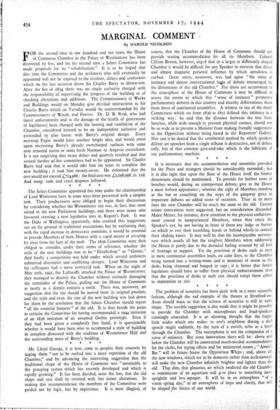Mr. Lloyd George, it is true, came to perplex their
counsels by urging them " not to be rushed into a mere repetition of the old Chamber," and by advancing the interesting suggestion that the traditional shape of the House of Commons was " unsuitable to the grouping system which has recently developed and which is rapidly growing." It has been decided, none the less, that the old shape and size shall be retained with but minor alterations. In making this recommendation the members of the Committee were guided not by logic, but by experience. It is most illogical, of
course, that the Chamber of the House of Commons should not provide seating accommodation for all its Members. Colonel Clifton Brown, however, urged that in a larger or differently shaped Chamber it would be difficult for any Speaker to exercise that direct and almost magnetic personal influence by which unruliness is curbed. Great stress, moreover, was laid upon " the sense of intimacy and almost conversational fo‘in of debate encouraged by the dimensions of the old Chamber." For those not accustomed lo the atmosphere of the House of Commons it may be difficult to assess the extent to which this "sense of intimacy" permeates parliamentary debates in this country and thereby differentiates them from those of continental assemblies. A witness to one of the many Committees which sat from 1836 to 1851 defined this intimacy in a striking way : he said that the distance between the two front benches, while wide enough to prevent physical contact, should not be so wide as to prevent a Minister from making friendly suggestions to the Opposition without being heard in the Reporters' Gallery. Nor can it be denied that the continental method by which speakers deliver set speeches from a single tribune is destructive, not of debate only, but of that constant give-and-take which is the lubricant of our parliamentary machine.


























 Previous page
Previous page